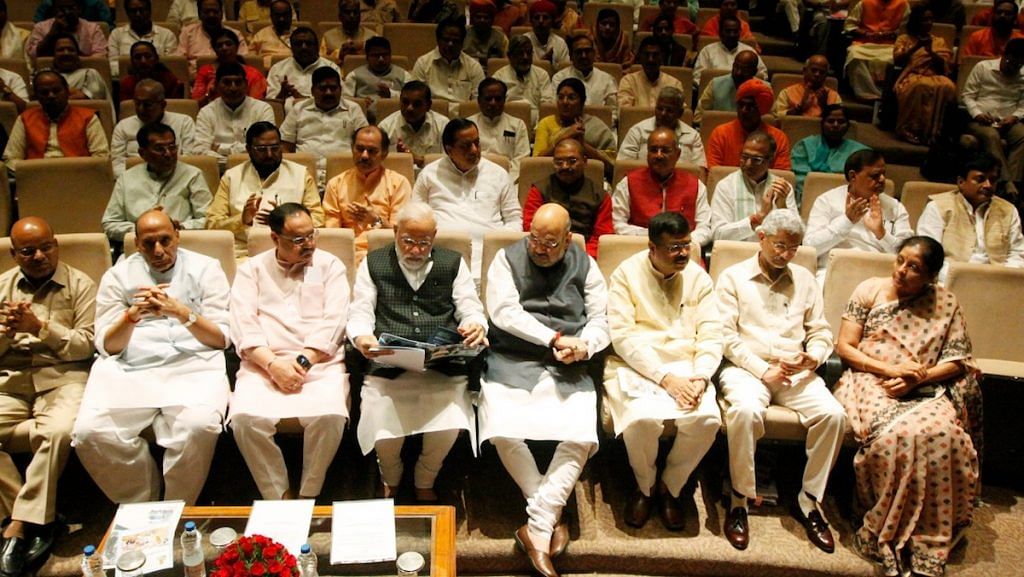Alpesh Thakor, who joined the Bharatiya Janata Party Thursday, is among the numerous Congress leaders who have switched sides in the last few months. The former Gujarat legislator joined the party with another Congress defector, Dhavalsinh Zala, and hundreds of party supporters.
The BJP looks upbeat and its state units seem to be competing with each other to get new recruits (from opposition) into the party fold.
But scratch the surface, and one can hear voices of concern and disagreement over this unnatural rise in the number of ‘outsiders’ in the BJP.
‘Swelling is not growth’ seems to be the warning from some senior leaders in the BJP as well as the Rashtriya Swayamsevak Sangh (RSS), the party’s ideological fountainhead.
The fear is real, they say. These new entrants may not add any value to the BJP or its ideology but get undue and undeserving share in power and decision-making. Moreover, they will likely quit, without batting an eyelid, if and when the going gets tough for the party.
Who are joining BJP?
The BJP can’t depend on politicians like Alpesh Thakor, given the speed at which they switch affiliation.
The 43-year-old leader, the convener of OBC Ekta Manch, was at the forefront of protest rallies against Patel community’s agitation demanding reservation in 2015. In no time, he reconciled with Patidar leader Hardik Patel to fight against the BJP, and shortly before the 2017 Gujarat election, joined the Congress. He won from Radhanpur constituency, defeating his nearest BJP rival by a margin of nearly 18,000 votes.
Also read: BJP confident OBC leader Alpesh Thakor will join soon, Congress confident he won’t
A little over a year later, Alpesh Thakor began distancing himself from the Congress, and resigned from all party posts in April this year, while rejecting claims that he would join the BJP. Earlier this month, he and Zala voted in favour of BJP’s Rajya candidate S. Jaishankar (now foreign minister), and then resigned from the House membership.
Of the many turncoats the BJP has inducted, there are many with questionable track record.
In April, the BJP in Himachal Pradesh inducted six-time Congress MLA Singhi Ram, who was arrested in 2008 for arranging a fake Class 12 certificate for his daughter’s admission in college.
In West Bengal, the BJP welcomed Manirul Islam, the former Trinamool Congress leader, whose name has cropped up in cases of alleged torture of political rivals. The BJP had called him and others joining the party as ‘eminent personalities’.
Losing the X-factor
Defectors from other parties joining the BJP no longer seems like news – one could consider it a part of the party’s routine membership drive. But even as the BJP’s rank is swelling, there are concerns in some quarters about this unnatural increase in numbers. These sections are, however, aware of their limitations and the current political compulsions to not make those concerns public.
Also read: All in a day — Trinamool mayor close to Mukul Roy resigns, 14 Bengali actors join BJP
But the current BJP leadership would do well to remember what differentiates the party from the rest: its cadre-based core. It is due to the party’s organisational structure that it witnesses less defection as compared to other parties. This is why the BJP could grow from a party with two MPs in 1984 to 303 MPs in 2019.
And that’s exactly why the Congress has seen a reverse trend and is facing an existential crisis today, despite having 53 MPs in the House.
BJP has a lesson to learn
The political system over the years has vested excessive powers in elected representatives. Once elected, the politician has enormous resources in his/her command and almost unrestricted power to utilise and distribute it as s/he wishes. Legal and administrative indicators are followed more in defiance than compliance. The lawmakers become a law unto themselves.
In a way, political parties are reduced to mere platforms for individuals to acquire power and build their individual support base. The party’s interests take a back seat. Today, no party can say with confidence that it will play by the rules, follow the principles, and not compromise with its stated, core values for the sake of political expediency.
A party that is not driven by an ideology but political opportunism will sooner or later implode, as seen in the case of the Congress.
Also read: BJP’s unique stand on induction in poll-bound Delhi — AAP defectors not welcome
The BJP should be wary of letting this culture seep into its internal functioning. It must filter new entrants and keep the history sheeters, corrupt elements and serial economic offenders out. Many of those joining the party are motivated by the desire to be part of the ruling elite and keep their political pot boiling.
While the likes of Alpesh Thakor and Mukul Roy join the BJP, the party’s central leadership would do well to ensure its core doesn’t get diluted or that its loyal workers do not feel sidelined or ignored. A disgruntled cadre will not bode well for the BJP’s chances in the next election.
The author is former editor of ‘Organiser’. Views are personal.
